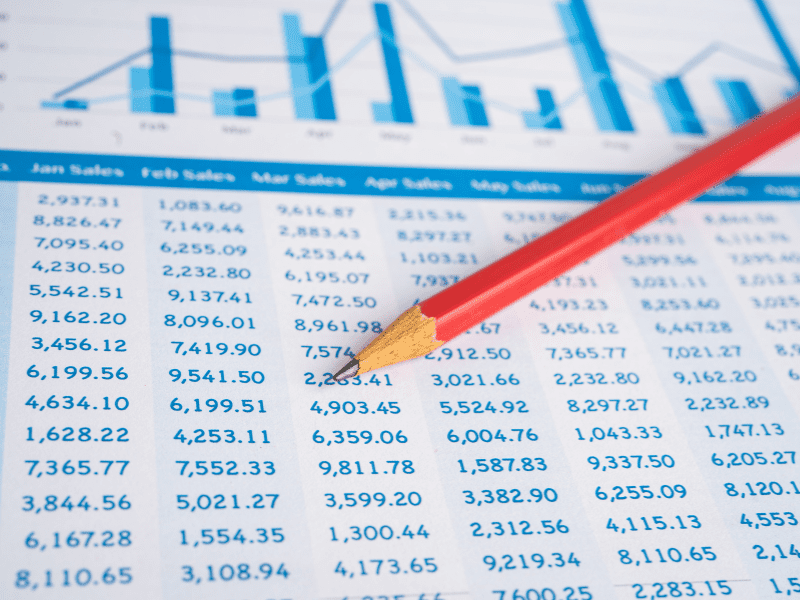In today’s fast-paced world, it’s easy to lose track of where our money is going. With countless expenses and financial obligations, it becomes crucial to understand the importance of tracking your spending. By keeping a close eye on your finances and implementing effective money management strategies, you can take control of your personal finance journey.
Financial tracking is not just about knowing how much money you have in your bank account; it goes beyond that. It involves actively monitoring and recording your expenses, understanding where your money is being allocated, and analyzing patterns and trends in your spending habits.

Budget tracking plays a vital role in helping you stay within your financial limits. It allows you to set realistic goals, prioritize expenses, and make informed decisions about where to allocate your funds. By having a clear picture of where every dollar is going, you can identify areas where you may be overspending or areas where you can potentially save.
Effective expense tracking enables individuals to make better financial choices by identifying unnecessary expenditures or potential savings opportunities. It empowers individuals to make conscious decisions about their spending habits and align their expenses with their long-term financial goals.
In this section, we will delve deeper into the significance of tracking your spending and explore various tools and techniques that can assist you in managing your personal finances more effectively. Whether you are looking to save for a specific goal or simply gain better control over your finances, understanding the importance of tracking your spending is the first step towards achieving financial stability and peace of mind.
Table of Contents
The Impact of Financial Awareness: Navigating Spending Habits for Success
In today’s fast-paced world, it’s easy to lose track of our spending habits and overlook the importance of financial awareness. However, taking the time to track your spending can have a profound impact on your overall financial success.
One of the key benefits of tracking your spending is that it provides a clear picture of where your money is going. By diligently recording every expense, you gain a deeper understanding of your financial habits and patterns. This knowledge allows you to identify areas where you may be overspending and make necessary adjustments to save money.
Moreover, tracking your spending helps you stay focused on your financial goals. Whether you’re saving for a down payment on a house, planning for retirement, or simply aiming to build an emergency fund, monitoring your expenses keeps you accountable and motivated towards achieving those goals.

Additionally, tracking your spending promotes effective financial planning. By having an accurate record of your expenses, you can create realistic budgets and allocate funds accordingly. This enables you to prioritize essential expenditures while cutting back on unnecessary ones.
Furthermore, by consistently monitoring your spending habits over time, you can identify trends and patterns that may be impacting your finances positively or negatively. This insight allows for informed decision-making regarding future purchases or investments.
Tracking your spending is essential for financial success as it enhances financial awareness, helps in saving money, supports the achievement of financial goals, and promotes effective financial planning. By incorporating this practice into our daily lives, we empower ourselves with the knowledge needed to make sound financial decisions and ultimately achieve greater stability and security in our lives.
How Can Tracking Your Spending Transform Your Financial Success?
In today’s fast-paced world, keeping track of our expenses has become more important than ever. Fortunately, there are several methods and tools available to help us effectively monitor our spending habits and stay on top of our financial goals.
One popular option is the use of expense tracker apps. These handy applications allow us to conveniently record and categorize our expenses on-the-go. With features like automatic transaction syncing, receipt scanning, and customizable budgeting options, these apps provide a user-friendly interface for managing our finances.
For those who prefer a more traditional approach, spreadsheets can be a powerful tool for tracking expenses. By creating a customized spreadsheet template or utilizing pre-made expense tracking templates available online, we can manually input our expenditures and easily calculate totals and analyze spending patterns.
Of course, manual expense tracking is another method that many individuals find effective. This involves physically recording each expense in a notebook or journal. While it may require more effort compared to digital alternatives, some people appreciate the tactile nature of this method and find it helps them stay mindful of their spending habits.
Ultimately, the choice of which method or tool to use for tracking expenses depends on personal preferences and needs. Whether opting for an expense tracker app with advanced features or embracing the simplicity of manual tracking methods, the key is finding a system that works best for you in order to maintain financial awareness and achieve your budgeting goals.
a) Using Mobile Apps to Track Your Expenses Easily and Effortlessly
In today’s fast-paced world, keeping track of our expenses has become more important than ever. With the rise of mobile technology, we now have the convenience of managing our finances right at our fingertips. Mobile apps designed specifically for expense tracking have made it easier and effortless to monitor our spending habits and stay on top of our budgets.
When it comes to choosing the best expense tracker app for your needs, there are numerous options available in the market. Reading reviews and comparing different mobile budgeting apps can help you make an informed decision. The year 2021 has brought us some exciting advancements in this area, with new features and improved functionalities being introduced by various app developers.

The beauty of using a mobile app for tracking expenses lies in its simplicity and accessibility. These apps offer user-friendly interfaces that allow you to input your expenses quickly and categorize them effortlessly. They provide visual representations such as charts and graphs that give you a clear overview of your spending patterns, helping you identify areas where you can cut back or save.
Furthermore, many expense tracker apps offer additional features like bill reminders, receipt scanning capabilities, budget goal setting, and even integration with other financial tools or platforms. This level of customization allows you to tailor the app to suit your specific needs and financial goals.
Utilizing a mobile app to track your expenses is an effective way to take control of your finances with ease. By reading reviews and comparing different options available in 2024, you can find the best expense tracker app that suits your requirements while simplifying the process of managing your budget effortlessly.
b) Creating a Personalized Spreadsheet to Monitor and Analyze your Expenses
In today’s fast-paced world, keeping track of our expenses has become more important than ever. Creating a personalized spreadsheet to monitor and analyze your expenses can be an effective way to gain control over your financial situation. With the help of an expense spreadsheet template and a well-thought-out setup guide, you can streamline the process and make it easier to track your spending habits.
An expense spreadsheet template serves as a foundation for organizing and categorizing your expenses. It provides a structured layout that allows you to input relevant information such as date, description, category, amount, and any additional notes. By customizing the template to fit your specific needs, you can create a system that works best for you.

Setting up an expense tracking Excel sheet may seem daunting at first, but with a comprehensive setup guide, it becomes much more manageable. The guide will walk you through the necessary steps to create formulas for automatic calculations, set up conditional formatting for visual cues on spending patterns, and establish data validation rules for accurate data entry.
By using a personalized spreadsheet to monitor and analyze your expenses, you can gain valuable insights into where your money is going. This information allows you to identify areas where you can cut back on unnecessary spending or make adjustments to achieve financial goals. Additionally, having all your expense data in one place makes it easier to prepare budgets or generate reports when needed.
Remember that creating an effective expense tracking system is not just about the tools; it also requires discipline and consistency in recording your expenses regularly. With dedication and the right tools at hand, managing your finances becomes less stressful and more empowering.
c) Traditional Pen-and-Paper Method: Pros and Cons of Manual Expense Tracking
When it comes to tracking expenses, the traditional pen-and-paper method has been a tried and true approach for many individuals. This method involves manually recording and organizing spending information in hand-written spending logs. While this approach may have its benefits, it also comes with its fair share of drawbacks.
One of the key advantages of manual expense tracking is its simplicity and accessibility. All you need is a pen and paper, making it a cost-effective option that doesn’t require any technological devices or software. Additionally, some people find the act of physically writing down their expenses to be more mindful and helps them stay aware of their spending habits.

On the other hand, there are several drawbacks to consider when relying solely on manual expense tracking. Firstly, it can be time-consuming and tedious to consistently record every expense manually. This can lead to procrastination or incomplete records, making it difficult to have an accurate overview of your financial situation.
Moreover, hand-written spending logs are susceptible to human error. Illegible handwriting or misplacing receipts can result in inaccurate data entry, leading to discrepancies in your financial records. Additionally, manual expense tracking lacks the convenience and efficiency offered by digital tools that can automatically categorize expenses and generate detailed reports.
While traditional pen-and-paper expense tracking may have its merits in terms of simplicity and mindfulness, it is important to weigh these benefits against the potential drawbacks such as time consumption and human error. Exploring digital alternatives or combining manual methods with technology could offer a more efficient solution for effectively managing your expenses.
Simplifying the Challenge: Effective Tips and Strategies for Daily Expense Tracking
Tracking daily expenses can be a daunting task, but with the right tips and strategies, it becomes much more manageable. One key tip is to establish a system for categorizing expenses effectively. By organizing your expenses into categories such as groceries, transportation, entertainment, and so on, you gain a clearer understanding of where your money is going.
Setting realistic budgets is another crucial aspect of effective expense tracking. It’s important to assess your income and prioritize your spending accordingly. By setting realistic budgets for different categories of expenses, you can ensure that you’re not overspending in one area and neglecting others.
Additionally, utilizing technology can greatly simplify the process of expense tracking. There are numerous apps and software available that allow you to easily input and monitor your expenses in real-time. These tools often provide visual representations of your spending habits, making it easier to identify areas where adjustments may be needed.
By implementing these tips and strategies for effective expense tracking, you can gain better control over your finances and make informed decisions about your spending habits.
a ) Setting Clear Financial Goals to Stay Motivated in the Process
In the journey towards financial success, setting clear and achievable goals is key to staying motivated and focused. By establishing smart financial goals and implementing long-term planning strategies, individuals can pave the way for their own financial well-being. These goals act as guiding lights, providing direction and purpose in our financial decisions. They help us stay disciplined, make informed choices, and ultimately achieve the greater financial freedom we aspire to.
In this article, we will explore the importance of setting clear financial goals, how to make them SMART (Specific, Measurable, Achievable, Relevant, Time-bound), and how long-term planning can shape our path to success. So grab a pen and paper – it’s time to embark on a journey of purposeful financial goal-setting! Thank you for introducing the topic of setting clear financial goals.

It’s indeed a crucial aspect of personal and professional growth. By defining our objectives, we can effectively measure progress and stay focused on achieving them.
The SMART framework you mentioned – Specific, Measurable, Achievable, Relevant, Time-bound – is an excellent way to approach goal-setting. By making goals specific and measurable, we provide clarity on what exactly we want to achieve and how we will gauge our success.
Ensuring that goals are achievable and relevant helps us set realistic expectations while aligning them with our values and aspirations. Lastly, incorporating a time frame adds a sense of urgency that motivates us to take action. Long-term planning plays a vital role in shaping our path to success.
It allows us to envision where we want to be in the future financially and strategically outline the steps necessary to get there. By taking into account factors such as income growth potential, investment opportunities, debt management strategies, and savings plans, long-term planning provides a structured roadmap towards achieving financial milestones.
As you embark on this journey of purposeful financial goal-setting with pen and paper in hand, remember that it’s important not only to set goals but also regularly review and adjust them as circumstances change or new opportunities arise.
Flexibility is key in navigating the ever-evolving landscape of personal finance. If I can assist you further with any specific aspects or offer additional insights along the way during your goal-setting process or long-term planning endeavor please feel free ask!
b) Automating Expense Tracking Efforts with Technology
In today’s fast-paced world, managing personal finances can often be a time-consuming and laborious task. However, with the advancement of technology, automating expense tracking has become more accessible than ever before. By leveraging automated banking alerts, digital receipts, and linking accounts to expense trackers, individuals now have powerful tools at their disposal to streamline this process and regain control over their financial lives.
Automated banking alerts serve as a proactive assistant in keeping track of expenses. By setting up customized alerts for specific transactions or spending thresholds, individuals can receive real-time notifications about their financial activities. This not only helps in staying on top of expenses but also ensures that any suspicious or unauthorized transactions are promptly detected and addressed.

Furthermore, the digitization of receipts has transformed the way we manage our expenses. Gone are the days of sifting through piles of paper receipts; now we can simply snap a picture or forward an email receipt to a designated digital repository. These digital receipts not only save physical space but also make it far easier to organize and categorize expenses for future reference.
Linking accounts to expense trackers takes automation one step further by providing a comprehensive overview of one’s financial landscape. These innovative tools automatically sync with bank accounts and credit cards to import transaction data directly into an expense tracking system. This eliminates the need for manual data entry while ensuring accuracy and efficiency in tracking spending patterns across multiple accounts.
Embracing these technologies empowers individuals by freeing up valuable time and energy that would otherwise be spent on tedious administrative tasks. It allows us to focus on more meaningful aspects of life while still maintaining a clear understanding of our financial well-being.
Automating expense tracking efforts through automated banking alerts, digital receipts, and linking accounts to expense trackers offers undeniable benefits in terms of time-saving convenience and improved financial management. As technology continues to evolve, these tools will undoubtedly play an increasingly significant role in helping us achieve our financial goals with ease and efficiency.
c ) Regularly Reviewing and Analyzing Your Expense Patterns
In today’s fast-paced and ever-changing world, it is crucial to stay on top of our financial habits and expenses. Regularly reviewing and analyzing our expense patterns not only helps us understand where our money is going but also enables us to identify spending trends that may need attention.
By taking the time to delve into our financial data, we gain valuable insights into our spending habits, both the necessary and the discretionary. This analysis allows us to see patterns that might otherwise go unnoticed, such as recurring subscriptions or impulse purchases. Armed with this information, we can make informed decisions about how to adjust our budgets accordingly.

Identifying spending trends is an essential step in maintaining a healthy financial lifestyle. It enables us to recognize areas where we may be overspending or areas where we can potentially save more. For example, if we notice that a significant portion of our monthly expenses goes towards eating out, we can consider meal prepping or cooking at home more often as a way to cut down on unnecessary costs.
Adjusting budgets based on expense analysis is key to achieving financial goals. With a clear understanding of where our money is going, we can allocate funds more effectively towards things that truly matter to us—whether it’s saving for a dream vacation or investing in long-term goals like buying a house or starting a business.
Regularly reviewing and analyzing expense patterns provides us with valuable insights into our financial habits. By identifying spending trends and adjusting budgets accordingly, we take control of our finances and pave the way for a more financially secure future.
Tracking your spending can have a significant impact on your financial health and future planning. By diligently monitoring where your money goes, you gain a clearer understanding of your financial habits and can make informed decisions to improve your overall financial stability.
Unveiling the Benefits: How Proper Expense Tracking Fuels Financial Success
One of the key benefits of tracking your spending is effective debt management. By knowing exactly how much you spend and on what, you can identify areas where you may be overspending or accumulating unnecessary debt. This awareness allows you to adjust your budget and allocate more funds towards paying off debts, ultimately reducing interest payments and accelerating the path to becoming debt-free.
Moreover, tracking your spending enables you to actively grow your savings. By identifying areas where expenses can be reduced or eliminated, you create opportunities for saving more money each month. These savings can then be allocated towards emergency funds, investments, or long-term goals like retirement planning.
Speaking of retirement planning, tracking your spending plays a crucial role in ensuring a financially secure future. By understanding how much money is needed for daily expenses and lifestyle maintenance during retirement, you can set realistic savings goals and make appropriate adjustments to meet them over time.
In summary, tracking your spending empowers individuals to take control of their financial well-being by effectively managing debt, growing savings, and planning for the future. It provides valuable insights into personal finance habits while enabling informed decision-making that leads to greater financial stability in the long run.
Proper expense tracking is essential for taking control of your finances. By diligently monitoring and recording your expenses, you can gain a clearer understanding of where your money is going and make informed decisions about how to manage it effectively.

One of the key benefits of expense tracking is that it allows you to identify areas where you may be overspending or wasting money. By categorizing and analyzing your expenses, you can pinpoint areas of unnecessary expenditure and make adjustments accordingly. This can help you cut back on non-essential items or services, freeing up more funds for savings or investments.
Moreover, proper expense tracking enables you to set realistic budgets and financial goals. With a clear picture of your income and expenditures, you can establish achievable targets for saving, debt repayment, or other financial objectives. Tracking your expenses also helps you stay accountable to these goals by providing regular updates on your progress.
Another advantage of expense tracking is the ability to detect any irregularities or fraudulent activities in your finances. By regularly reviewing your expenses, you can quickly identify any unauthorized charges or discrepancies that may indicate identity theft or fraudulent transactions. This allows you to take immediate action to protect yourself and rectify the situation.
Taking control of your finances through proper expense tracking is crucial for financial success. It empowers you with knowledge about your spending habits, helps you make informed decisions about budgeting and goal setting, and safeguards against potential financial risks. By implementing effective expense tracking practices, you can pave the way towards a more secure and prosperous financial future.
Also Read: Effective Strategies for Managing Income and Expenses: A Comprehensive Guide

1 thought on “A Comprehensive Guide to Tracking Your Spending: Mastering Your Finances”